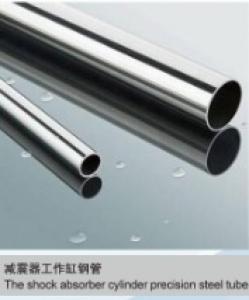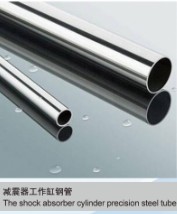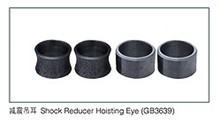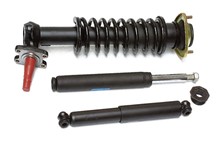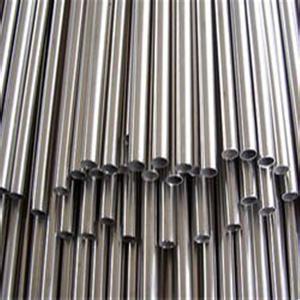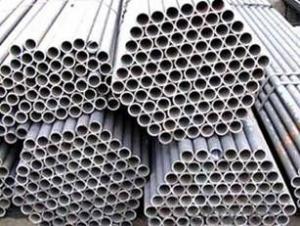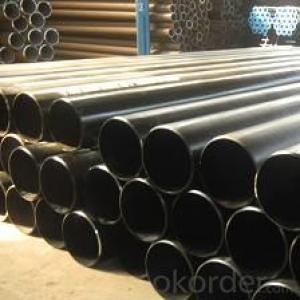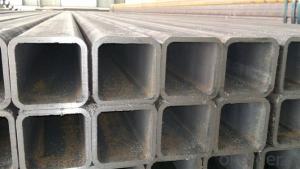Automobile and Motorcycle Shcok Absorber Precision Seamless Steel Pipe
- Loading Port:
- China Main Port
- Payment Terms:
- TT or LC
- Min Order Qty:
- 100 m.t.
- Supply Capability:
- -
OKorder Service Pledge
OKorder Financial Service
You Might Also Like
1、Structure of Automobile and Motorcycle Shcok Absorber Precision Seamless Steel Pipe:
Seamless pipe is formed by drawing a solid billet over a piercing rod to create the hollow shell. As the manufacturing process does not include any welding, seamless pipes are perceived to be stronger and more reliable. Historically seamless pipe was regarded as withstanding pressure better than other types, and was often more easily available than welded pipe.
2、Main Features of the Automobile and Motorcycle Shcok Absorber Precision Seamless Steel Pipe:
• High manufacturing accuracy
• High strength
• Small inertia resistance
• Strong heat dissipation ability
• Good visual effect
• Reasonable price
3、Automobile and Motorcycle Shcok Absorber Precision Seamless Steel Pipe Specification:
1.COMMODITY NAME | CARBON SEAMLESS STEEL PIPE |
2.STANDARD | JIS G3441,JIS G3444,JIS G3445; EN10305-1,EN10305-2; DIN2391; GB/T3639 |
3.MATERIAL | ST35,ST45, ST52 |
4.OUTER DIAMETER | 6-60MM |
5.WALL THICKNESS | 0.1-30MM |
6.LENGTH | 5.8M,6M,9M |
7.DELIVERY TIME | 20-40 DAYS AFTER SIGNING THE CONTRACT OR AS CUSTOMER' DEMAND |
8.BOTH OF ENDS | PLAIN ENDS OR BEVELED ENDS,PROTECTING CAPS |
9.PAKCING | IN HEXAGONAL PACKAGE TIED WITH STEEL STRIPS |
10.APPLICATION | AUTOMOBILE(MOTORCYCLE) SHOCK ABSORBER |
11.THE THIRD PARTY INSPECTION | SGS, BV OR AS CUSTOMER'S DEMAND |
12.PROCESS TECHLONOGY | COLD-DRAWN |
13.CERTIFICATE | ISO/TS 16949:2009 |
4、Packaging & Delivery
Packaging Details: | seaworthy package,bundles wrapped with strong steel strip |
Delivery Detail: | 15-30days after received 30%TT |
5、FAQ of Automobile and Motorcycle Shcok Absorber Precision Seamless Steel Pipe:
①How is the quality of your products?
Our products are manufactured strictly according to national and internaional standard, and we take a test on every pipe before delivered out. If you want see our quality certifications and all kinds of testing report, please just ask us for it.
Guaranteed: If products’ quality don’t accord to discription as we give or the promise before you place order, we promise 100% refund.
②How about price?
Yes, we are factory and be able to give you lowest price below market one, and we have a policy that “ for saving time and absolutely honest business attitude, we quote as lowest as possible for any customer, and discount can be given according to quantity”,if you like bargain and factory price is not low enough as you think, just don’t waste your time.Please trust the quotation we would give you, it is professional one.
③Why should you chose us?
Chose happens because of quality, then price, We can give you both.Additionally, we can also offer professional products inquiry, products knowledge train(for agents), smooth goods delivery, exellent customer solution proposals.Our service formula: good quality+good price+good service=customer’s trust
SGS test is available, customer inspection before shipping is welcome, third party inspection is no problem.
Any question, pls feel free to contact us !
6、Automobile and Motorcycle Shcok Absorber Precision Seamless Steel Pipe Images:
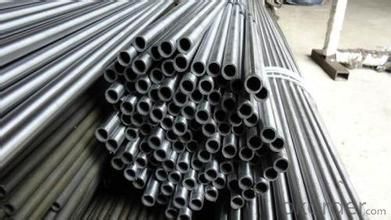
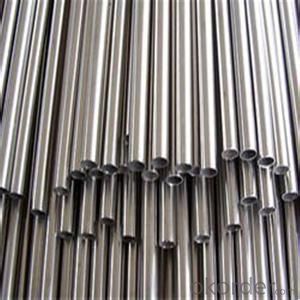
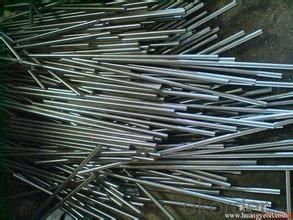
- Q: Are steel pipes resistant to corrosion?
- Yes, steel pipes are resistant to corrosion due to the protective layer formed by the oxide film on their surface. However, their resistance can vary depending on the specific type of steel and the conditions they are exposed to.
- Q: What are the different end finishes for steel pipes?
- Different end finishes are used for steel pipes, depending on their intended use and specific requirements. Some common types of end finishes for steel pipes include: 1. Plain End: This is the most basic and widely used end finish. The pipe is cut square at both ends without any additional treatment or threading. Plain end pipes are typically used for low-pressure applications or when welding methods will be used for connection. 2. Beveled End: A beveled end finish involves cutting the pipe at an angle, usually 30 or 37.5 degrees. This makes welding easier and creates a stronger joint. Beveled end pipes are commonly used for butt-welding applications, where two pipes are aligned and welded together at the beveled ends. 3. Threaded End: In this end finish, the pipe is threaded at both ends to allow for easy connection with threaded fittings or couplings. Threaded end pipes are commonly used in plumbing and gas distribution systems, as well as for applications that require frequent disassembly and reassembly. 4. Coupled End: Coupled end finishes involve the installation of couplings or connectors at each end of the pipe. This allows for quick and easy connection of pipes without the need for additional threading or welding. Coupled end pipes are often used in oil and gas pipelines or in applications where rapid installation is required. 5. Grooved End: A grooved end finish involves cutting grooves into the pipe's ends and using mechanical couplings or fittings to join the pipes together. This type of end finish is commonly used in fire protection systems and for large-diameter pipes that require efficient assembly. 6. Flanged End: Flanged end finishes involve attaching flanges to the pipe ends. These flanges can be bolted together to create a secure and leak-proof connection. Flanged end pipes are commonly used in applications that require easy disassembly and reassembly, such as in chemical plants or refineries. It's important to consider factors such as the application, required joint strength, connection method, and compatibility with other system components when choosing an end finish for a steel pipe. Consulting a professional or referring to industry standards is recommended to ensure the correct end finish is selected for a specific application.
- Q: What are the different grades of steel pipes?
- The different grades of steel pipes vary based on their chemical composition and physical properties. Some commonly used grades include carbon steel pipes (grades A, B, and C), alloy steel pipes (grades P1, P5, P9, and P11), stainless steel pipes (grades 304, 316, and 321), and duplex steel pipes (grades 2205 and 2507). Each grade offers specific characteristics suited for different applications and industries.
- Q: How do you calculate the pipe pressure drop for steel pipes?
- To calculate the pipe pressure drop for steel pipes, you can use the Darcy-Weisbach equation or the Hazen-Williams equation. The Darcy-Weisbach equation is generally more accurate but requires more information. It takes into account the pipe diameter, length, roughness, fluid flow rate, and fluid properties such as viscosity and density. The equation is as follows: ΔP = (f * L * ρ * V^2) / (2 * D) Where: ΔP is the pressure drop f is the friction factor (which can be determined using Moody's chart or by using empirical equations such as the Colebrook-White equation) L is the pipe length ρ is the fluid density V is the fluid velocity D is the pipe diameter The Hazen-Williams equation is a simplified version that is commonly used for water flow calculations. It is less accurate but easier to use. The equation is as follows: ΔP = K * Q^1.85 / (C^1.85 * d^4.87) Where: ΔP is the pressure drop K is the Hazen-Williams coefficient (which depends on the pipe material and roughness) Q is the flow rate C is the Hazen-Williams roughness coefficient d is the pipe diameter It's important to note that these equations provide an estimate of the pressure drop, and actual conditions may vary due to factors such as fittings, bends, and valves in the pipe system. Additionally, it's crucial to ensure that the units used in the equations are consistent (e.g., using SI units or US customary units).
- Q: Are steel pipes suitable for underground sewage lines?
- Yes, steel pipes are suitable for underground sewage lines. They are strong, durable, and resistant to corrosion, making them an excellent choice for sewage systems.
- Q: What are the potential health hazards associated with steel pipe installation?
- Some potential health hazards associated with steel pipe installation include exposure to hazardous chemicals used in the coating or treatment of the pipes, inhalation of dust or fumes generated during cutting or welding, and physical injuries due to accidents or mishandling of heavy equipment. Additionally, improper handling or disposal of waste materials and contaminated water can pose environmental health risks. It is important to follow proper safety protocols, use personal protective equipment, and ensure proper ventilation and waste management to mitigate these hazards.
- Q: How are steel pipes used in offshore wind farms?
- Steel pipes are used in offshore wind farms for a variety of purposes. They are commonly used as foundation structures to support wind turbine towers, providing stability and strength in the harsh marine environment. Steel pipes are also used for subsea cables and pipelines, allowing for the transportation of electricity and other resources. Additionally, they play a crucial role in the installation of offshore wind turbines, serving as installation aids and providing access for maintenance and repair activities. Overall, steel pipes are essential components in the construction, operation, and maintenance of offshore wind farms.
- Q: How are steel pipes used in the construction of solar power plants?
- Steel pipes are commonly used in the construction of solar power plants for various purposes. They are primarily utilized for the installation of solar panel mounting structures, which require sturdy and reliable support systems. Steel pipes are also used for the construction of infrastructure such as frames, racks, and supports for the solar panels. Additionally, they are employed in the installation of water and coolant systems, as well as for the transmission of fluids and gases within the plant. Overall, steel pipes play a crucial role in providing structural integrity and efficient functionality to solar power plants.
- Q: What are the different grades of steel used in manufacturing pipes?
- There are several grades of steel used in manufacturing pipes, including carbon steel, alloy steel, stainless steel, and duplex steel. Each grade has distinct properties and characteristics that make it suitable for different applications and environments.
- Q: What is the fire rating of steel pipes?
- The fire rating of steel pipes can vary depending on factors such as the thickness of the pipe, the type of insulation or fireproofing materials used, and the specific application or building codes. However, steel pipes are generally considered to have good fire resistance properties due to their non-combustible nature and ability to withstand high temperatures.
Send your message to us
Automobile and Motorcycle Shcok Absorber Precision Seamless Steel Pipe
- Loading Port:
- China Main Port
- Payment Terms:
- TT or LC
- Min Order Qty:
- 100 m.t.
- Supply Capability:
- -
OKorder Service Pledge
OKorder Financial Service
Similar products
Hot products
Hot Searches
Related keywords
